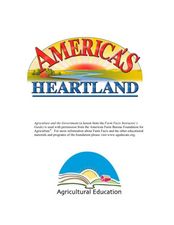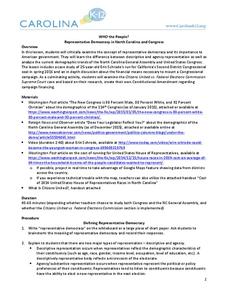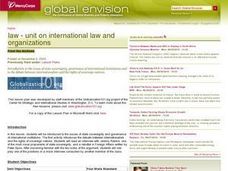School Improvement in Maryland
Dividing the Powers of Government
Who does what? To develop an understanding of the balance of power between the US federal and state governments, class members research responsibilities in terms of legal systems, security issues, economic activities, lawmaking, and...
National Endowment for the Humanities
George Washington: The Precedent President
Everyone knows that George Washington was the first president, but do your scholars know why that was so important? The lesson plan, the third in a sequence of three, allows learners to understand how George Washington set a precedent...
Curated OER
A Lesson To Accompany "The First Bank of the United States: A Chapter in the History of Central Banking"
Here is an interesting topic. Learners examine the economics that led to the founding of the First Bank of America. They participate in a reader's theater experience depicting the debate between Alexander Hamilton and Thomas Jefferson...
iCivics
Governing Communities
The government at the local level acts as perhaps one of the most relevant government systems to many in their communities. Learners discover how the local government shapes their lives and the similarities and differences between the...
Curated OER
Pay to Play?
Lead your class in a discussion about how they believe money influences politics. After reading "Go Ahead, Try to Stop K Street" from the New York Times, they evaluate the claims in the article about the current lobbyist scandal in...
Curated OER
Four Famous Faces
Each one of our quarters is embellished with a famous face or image representing the state it came from. This lesson uses South Dakota's state quarter to get kids thinking about monetary value, what the president of the United States...
Curated OER
Alexander Hamilton and the Roots of Federalism
Explore the origin of political parties in the United States. Learners work in groups to read and analyze copies of the "Report on Manufactures" written by Alexander Hamilton. Then, they complete a worksheet comparing the Federalists to...
Curated OER
Claiming Common Ground? The Civil War and the Preservation of Claiming Common Ground? The Civil War and the Preservation of George Washington's Mount Vernon
Students explore how people viewed George Washington in the 19th Century. In this U.S. History lesson, students create a timeline of events during the Civil War, including government and court decisions. Following this activity,...
Curated OER
Express Your Opinion
Students explore local, state, and national levels of government and discuss which level of government they should contact to get information, express their opinions, or get help on specific issues.
Carolina K-12
Are You a Democrat or a Republican? Are You Really?
Have new or soon-to-be voters examine different political parties and their platforms as they figure out which one aligns most with their beliefs. After taking a few online quizzes, students split into pairs to discuss and then in larger...
NPR
Civil Rights of Japanese-American Internees
Prompted by a viewing of Emiko and Chizu Omori’s Rabbit in the Moon, a documentary about the internment of Japanese-Americans during World War II, high schoolers examine a series of documents, including the Bill of Rights and the UN’s...
Stanford University
Great Society
Students explore the Great Society. In this U.S. history and government instructional activity, students view the video "The Great Society," identify the major points of the speech, and compare and contrast the content with The New Deal.
Curated OER
The Electoral Process
Students explore the U.S. political system by completing several worksheets. In this government election lesson, students define and describe the two main political parties in detail to one another. Students read a piece written by a...
Curated OER
Agriculture and the Government
Students study the government's involvement in the U.S. A's food production and make connections relating to farm programs. In this historical agriculture lesson, students read content and research significant information. Students then...
NPR
Same-Sex Marriage
The battle over same-sex marriage is a prevalent issue in the United States, and a valuable topic to be discussed in your social studies classroom. Here is a basic outline of introductory questions, focus questions, vocabulary, and media...
Classroom Law Project
How do we hire a President?
What are the job requirements for the office of president of the United States? What attributes should a candidate possess? Are the qualities needed to govern the same as those needed to win? What can an analysis of the management style...
Curated OER
Making an Appeal
Students make an appeal. In this making an appeal lesson plan students give characteristics of the Washington Supreme Court. Students examine public policy conflicts and present an appellate case.
Carolina K-12
Who the People? Representative Democracy in North Carolina and Congress
Our elected officials are supposed to represent us, but what does it mean when they aren't like us? Budding citizens explore the demographic makeup of the US Congress, the role of money in political elections, and the Citizens United...
Curated OER
Lobbying
Students examine the role of lobbyists in Washington, D.C. For this Legislative Branch lesson, students watch video segments and read excerpts about lobbying. Students write essays that explore the pros and cons of lobbying.
Curated OER
International Law and Organizations
Young scholars conduct research and debate some of the conflicting viewpoints surrounding state sovereignty vs. the governance of international institutions. They read interviews and participate in role-plays.
Curated OER
Going by the Rules
Students examine George Washington's Rules of Civility. In this George Washington lesson, students investigate how rules influence people, and the roles of citizens in America. Students will discuss and reword rules and work in groups to...
Curated OER
We the People…in the News
Students use the newspaper to explore the world around us, our past and our government. In this civics unit, students complete 40 different lessons in civic education using that day's newspaper to reinforce the concept being taught.
Curated OER
The Mayflower Compact
Eighth graders investigate historical documents of the United States by reading the Mayflower Compact. In this U.S. History lesson, 8th graders analyze the wording of the original Mayflower Compact of the first U.S. settlers and...
Curated OER
Constitution Lesson Plan
Third graders identify roles of Declaration of Independence and U.S. Constitution in establishing new country, create posters with their ideas about each part of Constitution, and explain three branches of government, including their...

























